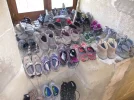Diegomartine
Member
- Time of past OR future Camino
- Sept 1st. (2014)
Hi guys,
I'm going to walk the camino from SJPDP to Santiago starting on May 1st 2013.
I would like to ask you about the rain, and if it a really intense rain or light, because I decided to walk using trail shoes from Salomon, I tried several boot but I feel better using the trail shoes.
This is the model that I have:
http://www.amazon.com/Salomon-Crossmax- ... nning+Shoe
Only the front of the shoes is waterproof, do you think will be enough? or should I get a complete waterproof shoe? if the rain is really light I think this will be fine, not sure.
Any advice?
Thanks!
I'm going to walk the camino from SJPDP to Santiago starting on May 1st 2013.
I would like to ask you about the rain, and if it a really intense rain or light, because I decided to walk using trail shoes from Salomon, I tried several boot but I feel better using the trail shoes.
This is the model that I have:
http://www.amazon.com/Salomon-Crossmax- ... nning+Shoe
Only the front of the shoes is waterproof, do you think will be enough? or should I get a complete waterproof shoe? if the rain is really light I think this will be fine, not sure.
Any advice?
Thanks!

























